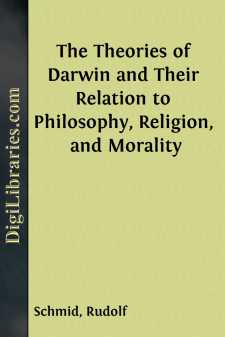Categories
- Antiques & Collectibles 13
- Architecture 36
- Art 48
- Bibles 22
- Biography & Autobiography 813
- Body, Mind & Spirit 142
- Business & Economics 28
- Children's Books 17
- Children's Fiction 14
- Computers 4
- Cooking 94
- Crafts & Hobbies 4
- Drama 346
- Education 46
- Family & Relationships 57
- Fiction 11829
- Games 19
- Gardening 17
- Health & Fitness 34
- History 1377
- House & Home 1
- Humor 147
- Juvenile Fiction 1873
- Juvenile Nonfiction 202
- Language Arts & Disciplines 88
- Law 16
- Literary Collections 686
- Literary Criticism 179
- Mathematics 13
- Medical 41
- Music 40
- Nature 179
- Non-Classifiable 1768
- Performing Arts 7
- Periodicals 1453
- Philosophy 64
- Photography 2
- Poetry 896
- Political Science 203
- Psychology 42
- Reference 154
- Religion 513
- Science 126
- Self-Help 84
- Social Science 81
- Sports & Recreation 34
- Study Aids 3
- Technology & Engineering 59
- Transportation 23
- Travel 463
- True Crime 29
The Theories of Darwin and Their Relation to Philosophy, Religion, and Morality
by: Rudolf Schmid
Categories:
Description:
Excerpt
AUTHOR'S PREFACE
The movement which received its impulse as well as its name from Darwin, seems to have recently passed its distinctest phase; but the more prominent points of opposition, religious, ethical, and scientific, which have been revealed through it, remain as sharply contrasted as before. The author of this book desires, in the first place, to be of service to such readers as feel the need of setting themselves right upon these questions, which touch the highest interests of mankind, but who lack time and opportunity to investigate independently a realm in which so many and so heterogeneous sciences come into mutual contact. The illogical and confused manner in which some noisy leaders confound these sciences and their problems and consequences, renders it still more difficult to arrive at a satisfactory result; and thus perhaps many readers will look with interest upon an investigation designed to simplify the different problems and the different attempts at their solution, and to treat them not only in their relations to each other, but also separately. But with this primary object, the author combines another: to render a service to some among the many who perceive the harmony between their scientific conviction and their religious need threatened or shaken by the results of science, and who are unwilling to lose this harmony, or, having lost it, desire to regain it. Those voices are indeed becoming louder, and more generally and willingly heard, which proclaim an irreconcilability between faith and knowledge, between the religious and the scientific views of the world; which declare that peace between the two can only be had at the price either of permitting the religious impulses of the heart to be stifled in favor of science, of satisfying the religious need of the mind with a nourishment which in the light of science proves to be an illusion, or, as sceptics in theory and eclectics in practice, of renouncing with resignation a logical connection and foundation to their former view of the world. The most striking proof of the extent to which these voices are heard, is the fact that it has been possible for a one-sided pessimism to become the fashionable system of philosophy in a Christian nation. The most effective means for opposing such discordant voices, and for making amends for the disagreements which they have occasioned, undoubtedly consists in the actual proof of the contrary of their theories, in the clear presentation of a standpoint from which not only the most unrestricted freedom of investigation and the most unreserved acknowledgment of its results shall be in perfect harmony with the undiminished care of our entire religious possession, but in which this peace is preserved and forever established by the very fact that one function of the mind directly requires the other, one possession directly guarantees the other. This is the standpoint of the author, and from it he has endeavored to treat all the questions which are to be taken into consideration....


